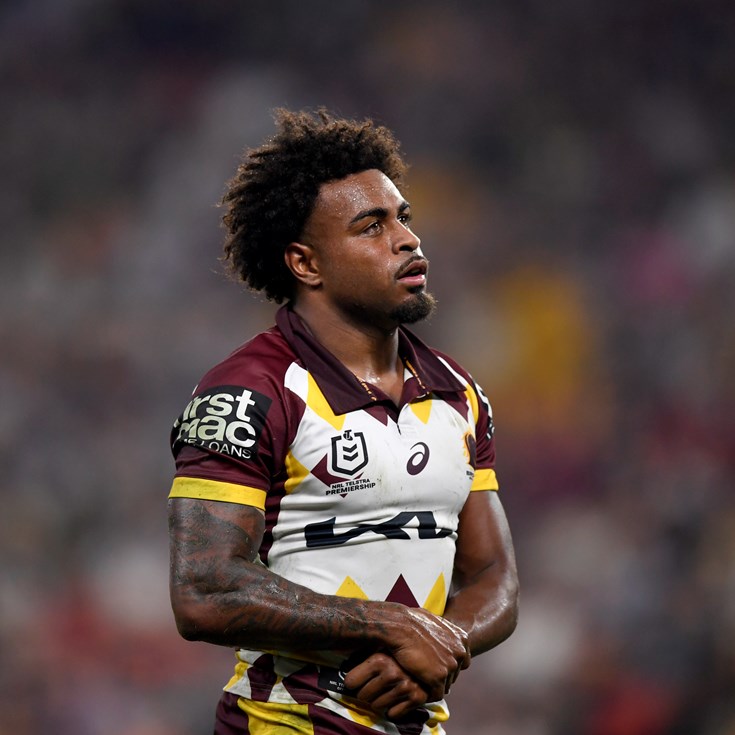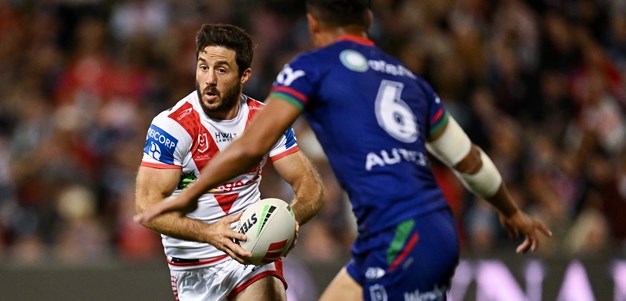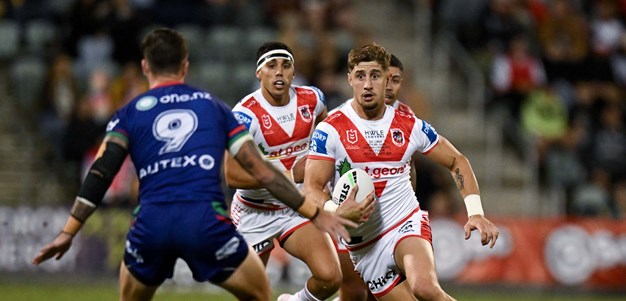Referees co-coach Bill Harrigan has conceded a controversial try awarded to Jonathan Wright in the Bulldogs 23-22 win over the Wests Tigers on Friday night should not have been awarded.
Harrigan revealed to NRL.com in a filmed edition of the Official View that he had taken the extraordinary step of organising a two-hour meeting with his whistle-blowers to clarify the obstruction interpretation.
Harrigan said the 74th minute try awarded in the Friday night blockbuster should have been disallowed due to the Bulldogs gaining an unfair advantage from an obstruction involving forward Frank Pritchard.
“Unfortunately we got this decision wrong,” Harrigan told NRL.com on Monday.
“What you can’t do is when the decoy player runs into the defensive line, you can’t run behind him and then gain an advantage by a run, pass or kick.
“[Frank] Pritchard runs behind the decoy runner and Liam Fulton is tackling him, but Pritchard actually offloads the ball. He has gained an advantage by the pass and that is why the try shouldn’t have been allowed.”
Harrigan is confident the two-hour meeting with the referees at their headquarters in Homebush will have an immediate impact on the quality and consistency of the decision making process.
“I’m not happy that I have had to come out at this point in the season and admit that we have made mistakes,” he said.
“Today I have had all the referees and all the video referees sit down and we have gone through a lot of our obstruction calls, we’ve worked hard to get clarity in what we are doing.
“There will be no confusion when we go into round 25 and 26 and into the semi-finals between the referees and video referees.
“We all know what we are doing, that was the whole objective of today, that we do all the work so that when we walked out of that room today, we all knew exactly where we stood when it comes to block runners and obstruction plays.”
While conceding the Bulldogs were wrongfully awarded a try, Harrigan was adamant the try awarded to the Gold Coast Titans in their game against the Eels at Skilled Park on Sunday afternoon was the correct decision.
“That was given a try and that is the correct decision,” he said.
“You can run behind your own player in some instances, in this case, by the time the ball carrier runs around and crosses the path of the decoy player, the decoy runner is already through the defensive line.
“There is no offence being committed because the defensive line is in front of the ball-carrier and the decoy runner has already gone through and is out of the way. No defender is being impeded in any way and that is why he is allowed to run on and set-up the try.”
There has been a lot of talk about the obstruction rule in recent weeks with players, coaches and media all speculating about rule interpretations.
NRL.com sat down with Harrigan to get a definitive answer on the controversial issue.
“The challenging part about the obstruction play and the thing that is probably causing most fans difficulty in understanding the block play or the decoy player, is when a player runs behind his own player,” Harrigan starts.
“The thing you have to look for… when he runs behind his own player, does he gain an advantage from that. When he is directly behind his own player, does it give the defence any opportunity to adjust and stay in the defensive line.
“If it doesn’t give the defensive line any time to adjust and then he takes an advantage via a run, pass or kick, then that will be pulled up as an obstruction.”
The main points Harrigan covered in his NRL.com interview:
- Bulldogs winger Jonathan Wright’s try should not have been awarded.
- Wests Tigers hooker Robbie Farah was held up.
- The try awarded to Titans’ Steve Michaels was the correct decision.
- Melbourne Storm was incorrectly awarded a benefit-of-the-doubt try in their match against the Broncos on Friday night – the decision should have been a knock-on against Sisa Waqa.
What to look for when determining an obstruction:
- Is there depth on the pass?
- Is there an inside/outside runner?
- Is there interference with the defence?
- Did you gain an advantage by running behind the player with a run, pass or kick?
Watch the full interview above.



